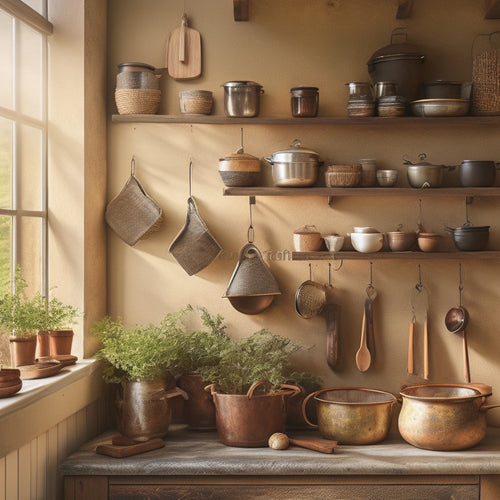
Stock Your Kitchen Smartly for Easy Cooking
Share
To stock your kitchen wisely for easy cooking, start by building a solid foundation with essential ingredients, tools, and equipment. Properly store ingredients to maintain freshness and guarantee easy access. Implement smart meal preparation strategies, such as advance planning and clever storage methods, to save time and reduce stress. Next, master fundamental cooking techniques, like searing and roasting, to elevate your dishes. Efficient kitchen organization and a well-stocked pantry are also essential for streamlined cooking. By following these guidelines, you'll be well on your way to cooking with ease and confidence, and discovering even more secrets to making mealtime a breeze.
Key Takeaways
• Start with essential ingredients and tools, including a chef's knife, cutting board, and pots and pans, to save time and reduce stress.
• Organize ingredients with proper storage, such as airtight containers for dry goods and designated refrigerated areas for perishables.
• Master fundamental cooking techniques like searing, roasting, sautéing, and braising to confidently tackle a variety of recipes.
• Implement smart meal preparation strategies, including advance planning, batch cooking, and freezing leftovers, to reduce kitchen stress and save time.
• Maintain a well-organized pantry with labeled and dated items, stored by expiration dates, to ensure easy access and visibility of ingredients.
Kitchen Essentials for Easy Cooking
Every well-stocked kitchen begins with a foundation of essential ingredients and tools that simplify meal preparation and make cooking a breeze.
Having the right equipment and ingredients on hand can save time and reduce stress in the kitchen. Essential tools, such as a chef's knife, cutting board, and pots and pans, are must-haves for any kitchen.
Additionally, proper ingredient storage is vital for maintaining freshness and safety. Store dry goods in airtight containers, and keep perishable items like meat and dairy products in designated refrigerated areas.
Smart Meal Preparation Strategies
Three essential components of smart meal preparation strategies are advance planning, efficient use of time, and clever storage techniques, all of which can help reduce kitchen stress and save time during busy weekdays.
By planning meals in advance, you can create a schedule that suits your lifestyle and guarantees that you're using up ingredients before they expire.
Time-saving meal prep techniques, such as cooking in batches and freezing leftovers, can also be a huge help.
Additionally, involving kids in the cooking process can not only be a fun and educational experience but also help teach them valuable skills.
Mastering Cooking Techniques Made Easy
With a few fundamental cooking techniques under your belt, you can confidently tackle a wide range of recipes and ingredients, elevating your culinary skills and expanding your meal options. Mastering basic cooking methods allows you to quickly adapt to new recipes and ingredients, making cooking more efficient and enjoyable.
Here are some essential techniques to master:
-
Searing: Lock in flavors and juices with a perfect sear on meats and fish.
-
Roasting: Bring out the natural sweetness in vegetables and meats with this easy, hands-off method.
-
Sauteing: Quickly cook ingredients while preserving their texture and flavor.
- Braising: Turn tougher cuts of meat into tender, fall-apart masterpieces.
Efficient Kitchen Organization Tips
A well-organized kitchen is essential to efficient meal preparation. It enables homeowners to quickly locate ingredients and cooking tools, saving time and reducing stress.
To achieve this, start by implementing decluttering tips such as regularly clearing out expired or unused items and assigning a designated spot for each kitchen tool. This will help prevent clutter from building up in the future.
Consider space-saving solutions like installing shelves, hooks, or a pegboard to maximize storage capacity and keep frequently used items within easy reach.
Stocking for Success: Pantry Secrets
Having a well-stocked pantry is essential to efficient meal preparation, as it allows homeowners to whip up a meal at a moment's notice and reduces the likelihood of last-minute takeout or grocery runs. A well-organized pantry is key to meal prep success. Here are some pantry secrets to keep in mind:
-
Pantry organization: Assign a home for each item to guarantee easy access and visibility.
-
Shelf life extension: Store items by their expiration dates to guarantee the oldest items are used first.
-
Label and date: Clearly label and date each item to maintain inventory and prevent expired goods.
- Rotate stock: Regularly rotate stock to guarantee that older items are used before they expire.
Frequently Asked Questions
How Do I Prevent Freezer Burn When Storing Frozen Meals?
'What's the point of meal prep if your frozen meals succumb to freezer burn? To prevent this, prioritize freezer organization, use proper packaging, and guarantee airtight seals to maintain peak food storage and preserve flavor and texture.'
Can I Substitute Ingredients in a Recipe Without Affecting the Flavor?
When substituting ingredients in a recipe, consider the flavor impact of each swap to guarantee taste consistency. Research equivalent ingredient swaps, and start with small modifications to assess the effect on the dish's overall flavor profile.
What Is the Best Way to Reheat Leftover Food Without Drying It Out?
When reheating leftovers, microwaving with a splash of liquid and covering with a microwave-safe lid preserves flavor, while oven reheating with a foil cover and low heat maintains moisture, ensuring a delicious and safe meal.
How Do I Convert a Recipe to Serve a Larger or Smaller Group?
To convert a recipe for a larger or smaller group, adjust ingredient measurements by scaling the recipe up or down, then adjust cooking times and serving sizes accordingly to guarantee food safety and best flavor.
Can I Use Expired Ingredients if They Still Smell and Look Fresh?
According to the USDA, 40% of food waste is due to confusion over expiration dates. When dealing with expired ingredients, prioritizing food safety is crucial over appearance; even if they appear and smell fresh, it's best to err on the side of caution and discard them.
Related Posts
-

Under-Sink Storage Tips for Minimalist Kitchens
To maximize under-sink storage in your minimalist kitchen, start by utilizing vertical space with shelf risers and st...
-

Rustic Hanging Racks for Country-Style Kitchens
Rustic hanging racks are a game changer for your country-style kitchen, blending functionality with charm. They maxim...
-

Wall-Mounted Racks for Kitchen Tool Storage
Wall-mounted racks are perfect for maximizing storage in your kitchen. By utilizing vertical space, you can free up u...


